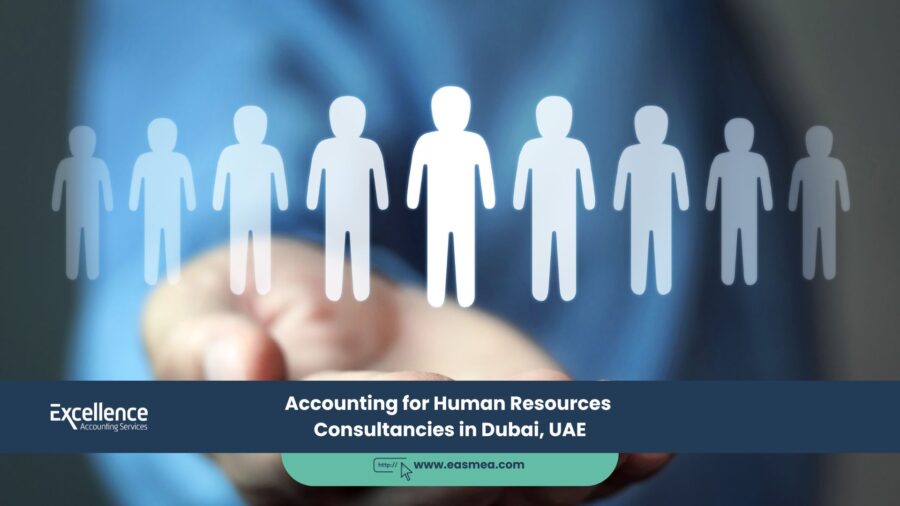In the UAE’s dynamic and diverse economy, human capital is the most valuable asset. HR consultancies in Dubai are the strategic partners that help businesses attract, manage, and develop this asset, providing essential services from recruitment and payroll outsourcing to policy development and training. While the focus is on people, the foundation of a successful HR consultancy is built on a solid and sophisticated understanding of its own finances.
Accounting for an HR consultancy in Dubai is a specialized field that must navigate a variety of revenue models and the critical responsibility of handling client funds for government-related processes. Profitability depends on accurate project costing, efficient service delivery, and meticulous compliance with the UAE’s labor and tax laws. Without a robust accounting framework, even a busy consultancy can face challenges with cash flow, client fund management, and profitability.
This definitive guide provides a strategic blueprint for Accounting for Human Resources Consultancies in Dubai, UAE. We will explore the critical financial practices for the HR sector, from the correct revenue recognition for recruitment fees and outsourcing services to the proper management of pass-through visa processing fees. We will also provide clarity on the application of VAT and the new UAE Corporate Tax to your professional services.
Whether you are a specialized recruitment firm, a payroll provider, or a full-service HR advisory, this guide will equip you with the financial knowledge to build a resilient and profitable practice. We will cover industry best practices, essential financial controls, and the reporting that builds trust with your clients and regulatory bodies like the Ministry of Human Resources and Emiratisation (MOHRE).
Key Takeaways
- Separate Client Funds from Firm Revenue: Money received from clients for visa processing or other government fees is a “pass-through” fund, not your revenue. It must be managed as a liability.
- Revenue Recognition Varies by Service: Recruitment fees, payroll service fees, and project fees all have different revenue recognition rules under IFRS 15 that must be applied correctly.
- Costing is Key to Profitability: You must track the cost of every project, primarily by allocating your consultants’ time, to understand which clients and service lines are truly profitable.
- Payroll Outsourcing has Unique Accounting: When managing a client’s payroll, you are handling their funds. This requires strict controls and reconciliation to ensure every dirham is accounted for.
- VAT and Corporate Tax Compliance: HR services are generally subject to 5% VAT, and your firm’s profits are subject to 9% Corporate Tax. Compliant accounting is a legal necessity.
The Financial Anatomy of an HR Consultancy
An HR consultancy is a professional service firm whose primary product is expertise in human capital management. The business model can be diverse, encompassing one-off recruitment projects, recurring revenue from outsourcing services, and project-based advisory work. Financial success depends on the ability to price these services profitably, manage the productivity of the consulting team, and maintain a high level of client satisfaction and retention.
Operating in the UAE means all activities related to employment are governed by the Ministry of Human Resources and Emiratisation (MOHRE). A deep understanding of the UAE Labour Law is not just part of the service you offer; it’s a critical compliance requirement for your own business operations. You can find official resources and regulations on the MOHRE website.
Core Principles of Accounting for Human Resources Consultancies in Dubai, UAE
The fundamental principle of accounting for human resources consultancies in Dubai, UAE, is the clear separation of your firm’s revenue from the client funds you handle, combined with the accurate allocation of your team’s time to determine the profitability of your services. This requires a sophisticated, project-based accounting system.
The Fiduciary Duty: Managing Visa Processing Fees
A significant part of many HR consultancies’ work involves PRO services, particularly managing the visa process for a client’s new employees. This involves collecting money from the client to pay for government fees for medical tests, Emirates ID, and visa stamping. It is absolutely critical to understand that this money is not your revenue. You are acting as an agent, holding these funds in trust before paying them to the relevant government departments.
These “pass-through” funds should be recorded as a liability on your balance sheet (e.g., “Client Visa Funds Payable”). When you make the payment to the government, you reduce this liability. Your actual revenue is only the professional fee you charge your client for managing this process. Commingling these funds with your own operating cash is a major financial and ethical risk. A professional bookkeeping service is essential to manage this correctly.
A Closer Look at Accounting for Human Resources Consultancies in Dubai, UAE
Profitability in the HR consulting field is driven by the efficient delivery of expertise. This requires a detailed approach to costing your services, managing different revenue streams, and ensuring every client engagement is financially viable.
Revenue Recognition for Diverse HR Services
Your agency likely offers a mix of services, each with its own revenue recognition model under IFRS 15:
- Recruitment Placements: For contingent placements, revenue should only be recognized after the candidate’s probation period has successfully passed. For retained searches, revenue is recognized as specific milestones (e.g., shortlist presentation) are achieved.
- Payroll Outsourcing: This is a recurring service. The monthly fee you charge is recognized as revenue in the month the payroll service is delivered.
- Consulting Projects (e.g., creating an employee handbook): For fixed-fee projects, revenue should be recognized over the life of the project, often using a percentage-of-completion method based on hours worked.
In HR consulting, your invoice marks the start of a process. Revenue is the result of its successful completion.
| Service Type | Revenue Model | IFRS 15 Revenue Recognition Point |
|---|---|---|
| Contingent Recruitment | Success-based fee. | Upon successful completion of the candidate’s probation period. |
| Payroll Outsourcing | Monthly retainer fee. | Recognized monthly as the service is provided. |
| HR Policy Project | Fixed project fee. | Recognized over the project timeline as work is completed. |
Costing Your Services: The Importance of Time Tracking
The primary cost of delivering any consulting service is your team’s time. To understand the profitability of a client or project, you must track the hours your consultants spend on it. This time-tracking data allows you to calculate the direct labor cost for each project. By comparing this cost (plus any other direct expenses and an allocation of overheads) to the project fee, you can determine its true profit margin. This data is essential for pricing future projects and for managing your team’s capacity and productivity.
Navigating Tax and Compliance in Dubai
A professional HR consultancy in Dubai must be fully compliant with the UAE’s tax regulations. For the most authoritative guidance, you should always refer to the official website of the Federal Tax Authority (FTA).
VAT on HR Services
The supply of HR consultancy, recruitment, and outsourcing services in the UAE is subject to the standard 5% rate of VAT. You must charge 5% VAT on your professional fees. The government fees for visas that you pay on behalf of a client and bill back at cost are generally considered disbursements and are outside the scope of VAT. Your invoice must clearly separate your taxable service fees from these non-taxable disbursements. Our specialized VAT services can provide essential clarity on these rules.
Corporate Tax for HR Consultancies
Your consultancy will be subject to the 9% UAE Corporate Tax on its annual taxable profits exceeding AED 375,000. Your taxable profit is your total revenue minus your deductible operating expenses (salaries, software, rent, etc.). The pass-through funds for visa fees do not impact your revenue or profit. The accuracy of your revenue recognition and cost allocation policies will directly impact your tax liability. Meticulous record-keeping is mandatory. Professional corporate tax services are vital for ensuring compliance.
What Excellence Accounting Services Can Offer
At Excellence Accounting Services (EAS), we have deep expertise in the professional services sector. We understand the unique financial responsibilities of HR consultancies, from managing client funds to the complexities of project-based revenue. We offer specialized accounting services to provide the financial control and strategic insight your firm needs.
Our specialized offerings for HR consultancies include:
- Client Fund & Pass-Through Cost Accounting: We help you set up and manage the correct procedures for handling client funds for visas and other fees, ensuring transparency and compliance.
- Revenue Recognition for Professional Services: We ensure your revenue from different service lines is recognized correctly under IFRS 15.
- Project & Client Profitability Analysis: We help you implement systems to track time and costs, giving you clear insights into the profitability of your various services and clients.
- VAT and Corporate Tax Compliance: Our tax experts will manage all your FTA filings, ensuring you are fully compliant with the rules for professional services.
- Virtual CFO Services: Get high-level strategic guidance on pricing, cash flow management, and firm profitability. For more details, see our Virtual CFO services.
By partnering with EAS, you gain a financial team that understands the business of people. We handle the financial complexity so you can focus on providing exceptional HR solutions to your clients.
Frequently Asked Questions (FAQs)
This is client money, not yours. When you receive the funds, you should record the full amount as a liability on your balance sheet in an account like “Client Visa Funds Payable.” As you pay the government fees for each stage of the process (medical test, Emirates ID, etc.), you will reduce this liability. The process should be completely separate from your own operating cash flow. Your professional fee for managing this process is your only revenue.
The most prudent and compliant accounting treatment is to recognize the revenue only after the 3-month probation period has been successfully completed by the candidate. Until that point, the placement is not truly “secure” as you may have a contractual obligation to provide a refund or replacement if the candidate leaves. Any invoice issued before the end of the probation period should create a “Deferred Revenue” liability on your balance sheet.
Yes. Subscriptions to professional platforms like LinkedIn Recruiter, applicant tracking systems (ATS), or HR information systems (HRIS) are a necessary cost of running a modern HR consultancy. As such, these subscription fees are fully deductible as a business expense when calculating your taxable profit for UAE Corporate Tax purposes.
Yes. The place of supply for general professional services is typically where the customer is based. However, for services that relate to a specific entity or operation, the place of consumption can be key. Since the HR policies and services are for the benefit and use of the client’s Dubai-based operations, the service is considered consumed in the UAE and is subject to 5% VAT. Cross-border service rules can be complex, and professional tax advice is recommended.
The salaries themselves are your client’s expense, not yours. When your client transfers the total payroll amount to you, this is client money. It should be held in a separate client funds account. You record this as a liability (e.g., “Client Payroll Funds”). When you process the payroll and transfer the net salaries to the employees via WPS and make payments for pensions etc., you reduce this liability. Your revenue is only the fixed monthly fee you charge the client for providing this payroll processing service.
There are several models. You can charge by the hour, which is simple but sometimes resisted by clients who want budget certainty. You can charge a fixed fee for a defined project (e.g., creating an employee handbook). To price a fixed fee profitably, you must first estimate the total number of consultant hours required and multiply this by a loaded hourly rate that covers your costs and profit margin. For ongoing advisory, a monthly retainer is a good model, providing you with predictable revenue.
WIP represents the value of the work your consultants have completed but have not yet invoiced. For example, if you have spent 20 hours on a client’s project this month at a billable rate of AED 500/hour, but you only invoice at the end of the month, you have AED 10,000 of WIP. It is a current asset on your balance sheet that represents future billings. Tracking WIP is crucial for understanding your firm’s true financial position.
First, try to resolve the dispute through negotiation, referring to the terms of your signed contract. If the dispute persists and you believe collection is at risk, you should make a “provision for doubtful debts” in your accounts. This records an expense for the potential loss and reduces the value of your accounts receivable on your balance sheet. This ensures your financial statements are not overstating your assets. If the debt is ultimately uncollectible, it would be formally “written off.”
Your accounting data is a powerful strategic tool. By tracking the time and costs associated with each client and project, you can perform a profitability analysis. This will show you which types of services (e.g., recruitment vs. policy writing) are most profitable and which clients are most valuable. This data allows you to focus your business development efforts on higher-margin work and to price new projects more accurately.
An independent audit provides a high level of trust and credibility. For an HR consultancy that handles client funds for payroll and visas, an audit provides independent assurance to your clients that you have robust financial controls and that their money is being managed with integrity. It can be a powerful differentiating factor when pitching to large corporate clients, who will value this level of professional governance.
Conclusion: The People Behind the Profit
In the human resources profession, your greatest asset is your people, and your greatest currency is trust. The financial management of your consultancy must reflect these values. A disciplined, ethical, and transparent approach to accounting is the essential framework that allows your firm to provide outstanding service while building a strong and sustainable business.
By mastering the complexities of revenue recognition, maintaining a firewall between firm and client funds, and navigating the UAE’s regulatory landscape with expertise, you build a consultancy that is as reputable as it is profitable. This financial clarity empowers you to price your services with confidence, invest in your team, and build a lasting reputation as a trusted partner in human capital management in the dynamic Dubai market.
From People to Profit & Loss.
Let Excellence Accounting Services provide the specialized financial management and compliance expertise your firm needs to succeed in the UAE.




